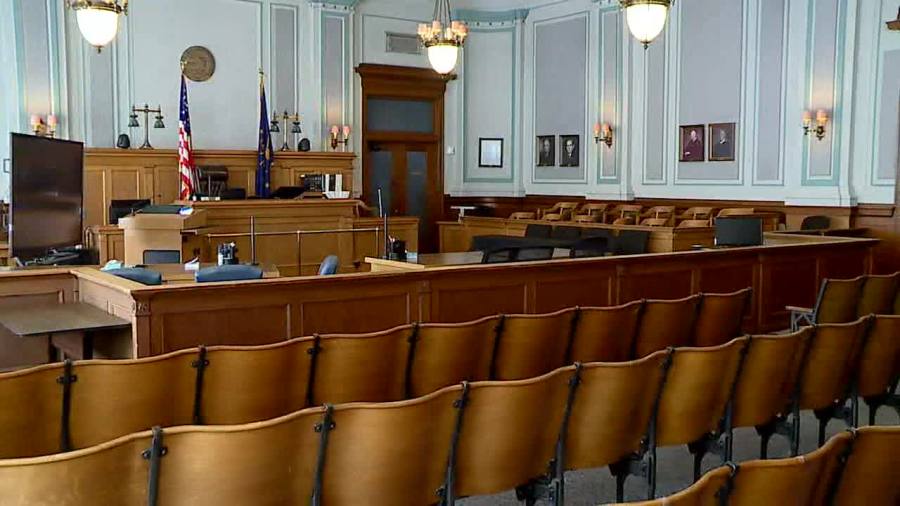DELPHI, Ind. — Jurors in the trial of the State of Indiana versus Richard Allen are set to begin their fourth day of deliberations at 9 a.m. Monday. Jurors will consider the evidence against a Delphi man charged with the murders of Libby German and Abby Williams near the Monon High Bridge on Feb. 13, 2017.
The jury received the case at 1:35 p.m. Thursday and met for 14.5 hours over three days before standing down Sunday, sequestered and unable to access their cellphones, computers or families.
Saturday’s session lasted 4.5 hours and included viewing of videos previously entered into evidence.
The jurors have watched a pair of police interviews of Allen from October 2022. The interviews were conducted weeks after his name surfaced as a potential suspect following the discovery of an original 2017 interview in which Allen admitted to being on the bridge the day Abby and Libby were killed at approximately the same time and wearing the same clothes as Bridge Guy, the suspected killer whose image was captured on Libby’s cell phone at 2:13 p.m. that day.
A witness and security camera spotted a vehicle that looked like Allen’s on a road near the bridge that afternoon.
During the first interview with investigators, days before he was arrested, Allen was advised of his right to remain silent and seek the counsel of an attorney, but he kept talking to police.
In that interview, Allen is at first cooperative with the questioning of former Delphi Police Chief Steve Mullin. As the interview continued, however, he grew more reserved when asked what he was wearing the day of the killings.
By the end of the 90-minute session, Allen denied Mullin’s request to “look around” his house after being shown a photograph of Bridge Guy and told police believe it is him.
Later that day, Indiana State Police detectives searched Allen’s home, discovering knives, clothing, a bullet and a gun. The latter items, said investigators, linked Allen to the crime scene.
ISP also seized Allen’s car, a black 2016 Ford Focus. While he watched police’s search from inside a state trooper’s vehicle in his driveway, Allen was told the state would reimburse him for any damage to his house during the search. Allen then reportedly said, “It doesn’t matter. It’s all over.”
A week later, Allen was told he could retrieve his car at the ISP Lafayette Post. When Allen and his wife arrived, however, Allen’s wife was told to wait in the lobby because police had more questions for her husband.
Allen continued to answer the questions of Sergeant Jerry Holeman, who told jurors he reminded Allen of his right to remain silent. When Allen was told that an unfired bullet found at the crime scene came from the gun seized from his house, he admitted nobody else had access to his .40 Sig Sauer.
Despite that admission, Allen denied his involvement in the crime. He also challenged Holeman to charge him, but leave his wife out of the investigation.
During a break in the interview, Kathy Allen asked her husband how a bullet from his gun could be found at the crime scene. Allen said he didn’t know.
Within minutes, Allen was arrested, and within days, he was whisked through his initial court appearance without the presence of an attorney. Allen was subsequently housed in two separate county jails before being taken to solitary confinement “for his own protection” inside a maximum security state prison.
After his incarceration, Allen was publicly identified as a suspect. He was eventually, assigned two attorneys by Special Judge Fran Gull, who was called in by the Indiana Supreme Court to oversee the case following the recusal of the original Carroll County judge who signed the search warrant for Allen’s house and his arrest warrant.
During his pre-trial detention at the Westville Correctional Facility in the prison’s internal heightened security unit, Allen developed psychosis after six months of solitary confinement, according to an Indiana Department of Correction contract psychologist.
It was during that mental health crisis that Allen repeatedly confessed to killing Abby and Libby in prison phone calls to his family and again to the psychiatrist, with added confidential details, after he emerged from the psychosis.
In its closing arguments last Thursday, the State asked jurors to consider Allen’s own words and his similarities to the timing and image of Bridge Guy.
The defense argued that Allen made false confessions under mental duress and investigators never established a DNA link between their client and the crime scene. The defense also contends that the ISP lab tests of his gun that replicated tool marks on the bullet found at the scene were the result of faulty firearms forensics.
Throughout the trial, Carroll County Prosecutor Nicholas McLeland was forced to overcome, sometimes while preemptively questioning his own witnesses, admitted mistakes by investigators who detailed lost evidence, tests that were not conducted or leads not followed up.
Judge Gull, in her instructions to jurors, told the panel of seven women and five men from Fort Wayne that they could depend on overwhelming circumstantial evidence to reach a guilty verdict while considering inconsistent witness testimony, that they must find guilt beyond a reasonable doubt, but not necessarily over every possible doubt, and that the jury must give Allen the benefit of the doubt if they find while comparing arguments and evidence that it’s a 50/50 tie.


